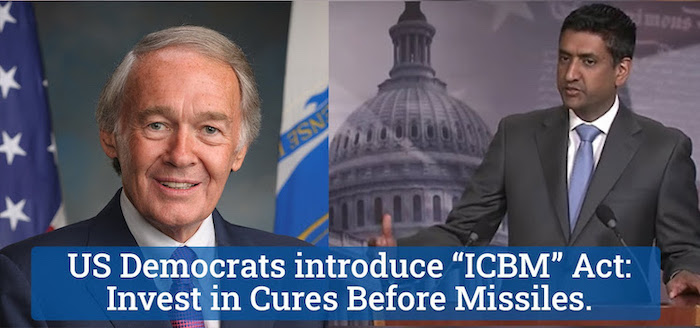By Jamshed Baruah
GENEVA (IDN) — The Nobel laureate International Campaign to Abolish Nuclear Weapons (ICAN), a coalition of non-governmental organizations promoting adherence to and implementation of the United Nations nuclear weapon ban treaty, has been pleading for divestment in nuclear weapons. “The imminent entry-into-force of the United Nations Treaty on the Prohibition of Nuclear Weapons (TPNW) allows for a unique opportunity to hit the nuclear weapons producers where it hurts—their wallets,” an ICAN campaign says. [2021-04-14|01] GERMAN | HINDI | JAPANESE
As the risk of a nuclear detonation is reaching levels not seen since the Cold War, banks, pension funds and investment firms still invested $748 billion in the production of nuclear weapons between 2017 and 2019, putting our savings into a weapon that can unleash unprecedented humanitarian suffering across the whole world, ICAN argues.
While addressing the health and economic challenges of the COVID-19 pandemic, Parliamentarians for Nuclear Non-Proliferation and Disarmament (PNND) and other legislators around the world have been addressing budget allocations, especially those relating to nuclear weapons and other military items.
Some of these are outlined in the resource Assuring our Common Future: Parliamentary handbook on disarmament for security and sustainable development, which PNND and the Inter-Parliamentary Union launched in November 2020, in particular in the chapter on Pandemics and disarmament, public health and economic sustainability.
Two Democrats in the U.S. Congress have now launched an additional initiative—known as the ICBM Act. It aims at stopping the further development of the Pentagon’s new $93-96 billion ground-based strategic deterrent (GBSD) intercontinental ballistic missile (ICBM) and direct those savings towards the development of a universal coronavirus vaccine. “The United States should invest in a vaccine of mass prevention before another new land-based weapon of mass destruction,” says Democratic Senator Ed Markey.
He is Co-President of the Parliamentarians for Nuclear Non-Proliferation and Disarmament (PNND), a non-partisan forum for parliamentarians nationally and internationally to share resources and information, develop cooperative strategies and engage in nuclear non-proliferation and disarmament issues, initiatives and arenas.
Sen. Markey launched the initiative on March 26, 2021, jointly with the Democrat Rohit Khanna who has been serving as the U.S. Representative from California’s 17th congressional district since 2017. He is Chairman of the Senate Foreign Relations Subcommittee on East Asia, and Member of the House Armed Services Committee. Khanna also served as the Deputy Assistant Secretary in the United States Department of Commerce under President Barack Obama from August 8, 2009, to August 2011.
“The ICBM Act makes clear that we can begin to phase out the Cold War nuclear posture that risks accidental nuclear war while still deterring adversaries and assuring allies and redirect those savings to the clear and present dangers posed by coronaviruses and other emerging and infectious diseases,” said Khanna.
“The devastation sown by COVID-19 would pale in comparison to that of even a limited nuclear war. The ICBM Act signals that we intend to make the world safe from nuclear weapons and prioritize spending that saves lives, rather than ends them,” he added.
“The GBSD program is unneeded… there is simply no logical reason to allow the program to move forward. For much cheaper, we can extend the lifespan of the Minuteman III missiles we already have and instead focus on investing in the urgent national security threat in front of us: the COVID-19 pandemic,“ he continued.
The Government Accountability Office (GAO) has continually cited affordability concerns related to the estimated $1.7 trillion dollars—which includes the GBSD, associated warhead, and plutonium pit production requirements—that is planned through fiscal year 2046 to upgrade the U.S. nuclear weapons enterprise.
The ICBM Act demonstrates that the United States can maintain a safe, secure, effective and affordable nuclear arsenal that deters adversaries and reassures allies without making a multi-generational estimated $260 billion life-cycle investment in the GBSD. An October 2020 public opinion poll showed that only 26 per cent of registered voters preferred replacing the Minuteman III intercontinental ballistic missile with GBSD, as compared to 60 per cent of registered voters who opposed replacing the Minuteman III missile.
Bill Perry, former Secretary of Defense, supports the legislation: “Whatever you think ails this nation, a new generation of nuclear missiles is not the answer. The good news is that the country can save money and become more secure at the same time. Congress can and should redirect this nuclear funding to address more pressing needs like the pandemic.“
Former Congressman John Tierney, Executive Director, Council for a Livable World, said: “When more Americans have died from the coronavirus than in combat in World War II, it is time for the United States to rethink its national security priorities…Instead of building more weapons to fight a Cold War strategy, let‘s invest in meeting the challenges of today and tomorrow.“
Tom Collina, Policy Director, Ploughshares Fund, said: “It is time to put masks and vaccines before new nuclear missiles. We shouldn’t spend our limited resources on nuclear weapons that we don’t need and that make(s) us less safe. Instead, we must redirect tax dollars to helping families and fighting the pandemic.“
Stephen Young, Acting Co-Director, Global Security Program, Union of Concerned Scientists, said: “Not only does the United States not need ICBMs to keep us protected, (but) their current ‘prompt launch‘ posture makes nuclear war more likely due to the risk of mistaken or accidental launch.“
In that light, he added, the United States should not spend $264 billion to build and deploy hundreds of land-based missiles, but devote those resources to higher priorities like ending the pandemic, addressing the climate crisis, and building racial equity. The ICBM Acts begins that vital process. [IDN-InDepthNews — 14 April 2021]
Photo: US Democrats—Senators Markey and Khanna— introduce ICBM Act: Invest in Cures Before Missiles. Credit: UNFOLD ZERO | PNND.




